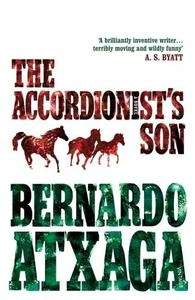The Accordionist's Son

Editorial Vintage UK
Fecha de edición octubre 2008
Idioma inglés
Traducción de Jull Costa, Margaret
EAN 9780099492771
400 páginas
Libro
encuadernado en tapa blanda
Resumen del libro
David Imaz has spent many years living in exile on a ranch in California, far from his native Basque Country. Nearing fifty and in failing health, he decides to write the story of his youth in the village of Obaba, and the powerful, sweeping narrative that ensues takes the reader from 1936 to 1999. As a young man, David divides his time between his Uncle Juan's ranch and his life in the village, where he reluctantly practises the accordion, a tradition which his authoritarian father insists that he continue. He becomes increasingly aware of the long shadow cast by the Spanish Civil War.
Letters found in a hotel attic, along with a silver pistol, lead David to unravel the story of the conflict, including his father's association with the fascists, and the opposition of his uncle, who took considerable risks in helping to hide a wanted republican. With affection and lucidity Atxaga describes the evolution of a young man caught between country and town, between his uncle the horse-breeder and his political father. The course of David's life changes one summer night when he agrees to shelter a group of students on the run from the military police.
Few contemporary writers are as adept at exploring memory and evoking friendship, love and happiness as Bernardo Atxaga, and in this, his most personal and accomplished novel to date, he places these themes against the tragic backdrop of civil war and its aftermath and shows how these have affected the Basque people.
Biografía del autor
x{0026}lt;P x{0026}lt;B Bernardo Atxaga x{0026}lt;/B (Asteasu, Gipuzkoa, 1951) es considerado el máximo exponente de la narrativa vasca y uno de los creadores de mayor hondura y originalidad en el panorama literario español. Se consagró con el libro x{0026}lt;I Obabakoak x{0026}lt;/I (1988), Premio Nacional de Narrativa en 1989 y llevado al cine por Montxo Armendáriz como x{0026}lt;I Obaba x{0026}lt;/I (2005). A este le siguieron novelas como x{0026}lt;I El hombre solox{0026}lt;/I (1994), Premio Nacional de la Crítica denarrativa en euskera, x{0026}lt;I Esos cielosx{0026}lt;/I (1996), x{0026}lt;I El hijo del acordeonistax{0026}lt;/I (2003), Premio de la Crítica 2003, premio Grinzane Cavour en 2008, y adaptada al teatro y al cine bajo la dirección de Fernando Bernués; x{0026}lt;I Siete casas en Francia x{0026}lt;/I (2009), finalista en el Independent Foreign Fiction Prize 2012, finalista en el Oxford Weidenfeld Translation Prize 2012; x{0026}lt;I Días de Nevadax{0026}lt;/I (2014), Premio Euskadi, y x{0026}lt;I Casas y tumbasx{0026}lt;/I (2020). En 2017 obtuvo el Premio Internacional LiberPress Literatura, en 2019 el Premio Nacional de las Letras Españolas y en 2021 el Premio Liber, los tres por el conjunto de su obra. También es autor de poesía. Sus libros han sido traducidos a treinta y dos lenguas. Es miembro de la Academia Vasca.x{0026}lt;/P








